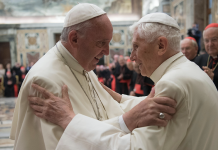
by Susan K. Sack
For a more comprehensive Study Guide and Related Readings, see the end of this article.
What does God want of you? A simple question—but perhaps not easy to answer. Probably the best response to what God asks of us is “to love as Jesus loved, to deny ourselves, and to follow him.” God wants us to become disciples.
The Sacrament of Baptism initiates us into the life of discipleship. Discipleship comes from the word discipline, which implies a certain way of life. As baptized Christian disciples, we are to practice Jesus’ way of life—particularly that which Jesus describes in the Beatitudes.
Each of us is called to this. This vocation isn’t just for monks or nuns or deacons or even lay ministers or catechists. It is for all of us who desire to have God in our lives, who long to become the people we are meant to be. It is about shedding our religious mediocrity for holiness, a holiness that grows daily as we increasingly “put on” Jesus. We are to be people who hear and obey the voice of God by putting the word into action in our lives, witnessing and proclaiming God’s love to the world.
Called to Perfect Holiness
The great document of the Second Vatican Council, Lumen Gentium, tells us that, whatever our state in life, we are all called by God to perfect holiness. We are called to the holiness expressed in the Beatitudes, for they describe what disciples are to do now, as well as who disciples will become if they follow Jesus. The Beatitudes are a portrait of what discipleship is about. The Beatitudes act as a compass, a spiritual GPS unit one might say, for those on the journey of Christian discipleship. Live this way, and you are indeed blessed.
It certainly is easy to lose direction today, so we need a compass! In the past, things seemed much more clear-cut. The Christian way of life wasn’t questioned nearly so much. Families participated in the Sacraments on a regular basis, followed the Commandments, and listened to their priests. Distinct expectations existed. Now, generally, nothing seems expected; life becomes what we make up as we go along.
So it can be very difficult to know how to “be poor in Spirit” in this freeform world of competitive, consumerist glee. Is it possible to be meek or to be a peacemaker and still survive? Is it even possible to be disciples?
For those determined to respond to God’s call in the affirmative and to live a Beatitude discipleship, this article suggests that four characteristics seem crucial. These attributes are interwoven and build on each other. Disciples 1) are rooted in Scripture and prayer; 2) live a life of integrity; 3) express compassion through action; and 4) undergo lifelong conversion.
1. Rooted in Scripture and Prayer
The contemporary world is a constant stream of words and images, so it can be difficult to sort out what is important and what can be overlooked. As Christian disciples, we have a primary task to be willing to listen, to open our hearts so that we can bring God’s word into our own world. God can then shape our world.
How can we know how to live the Beatitudes if we don’t know what the Beatitudes say? This involves more than just reading Scripture; discipleship really occurs when the word read becomes the word lived in our daily lives. That transformation occurs through prayer.
Prayer is the expression of our relationship with God. This relationship grows through prayer and through Scripture. Beyond that, prayer is difficult to define, as it can take so many different forms. In fact, prayer takes on almost as many forms as the number of pray-ers—as each of us prays in our own manner and in different ways at different times in our lives.
Surveys tell us that almost everyone prays in at least some rudimentary fashion. For disciples, prayer, like reading Scripture, can be neither rudimentary nor optional. Disciples who wish to live Beatitude lives must make prayer central to life.
So as disciples, we must commit ourselves to reading Scripture and praying regularly, both privately and communally. Yet, few Catholics actually do this. Why? Probably the primary reason is fear. The Bible is a huge and complex book! How does one even know where to start? Also, both prayer and Scripture make demands of those of us who pay attention. They cause us to reconsider our worldview. It can be tough to do this, so why put ourselves through it?
Yet, with prayer and Scripture we are swept into the consciousness of those things that are God. We begin to recognize, or to discern, certain moments in life as “of God.” God is then not only at the center of life; in a sense, God becomes life and all life becomes prayer. Our knowledge of what discipleship is about and how to better practice it also expands.
On a regular basis, too, disciples should ask if their prayer brings further conversion toward Christ. As the stories of the saints tell us, at certain points in our lives we will be asked to move deeper into prayer, toward further transformation of our lives in and toward God.
Pick up Scripture and Read It!
If you don’t have a good study Bible, find one (the bishops recommend the New American Bible) that has some background information so that you are better able to understand the social and historical context of each book. Consider finding a group of fellow parishioners or catechists with whom to study, and commit to finding a trained, competent person to whom you can go with questions.
Perhaps you might want to investigate some of the traditional forms of prayer that start with Scripture, such as lectio divina, the Liturgy of the Hours, or the Eucharist. The Eucharist is the pinnacle of Christian life and the type of communal prayer in which each disciple should participate regularly.
2. Lives a Life of Integrity
Its one thing to say discipleship is about holiness, prayer, and Scripture. But it’s another thing to know what holiness looks like. In comparison to much of society, most of us probably think we are “good enough.” So we can’t all be the monk praying in a cell or a martyr giving our life for Christ. But isn’t intermittent reading of the Bible and Mass on Sunday enough?
When the word of God becomes the basis of life, then disciples should increasingly reflect the being of God. The Beatitudes make just that argument: God must be seen in our actions and our attitudes. Having lived in God’s word and expressed that relationship with God through prayer, disciples reflect and faithfully live out that word.
Discipleship means we will incorporate into our behavior the primary qualities of God, including generosity, mercy, and forgiveness. This fidelity to God means we must be willing to examine regularly both our internal and external lives, with Jesus as the model for our actions. We must develop the habit of reflecting on our daily lives.
One aspect of this examination is to ask what it is we are “living for.” Do we live for God’s kingdom rather than for ourselves? Do we fill up the emptiness and self-doubt we sometimes feel with material things, with a scrambling for more privileged positions, with addictive behavior? Is it even possible for us to be meek and poor and recognize the longing we feel for God? Discipleship is about trusting that God alone can fill up the emptiness we experience and give us the security we desire.
So living a life of integrity implies that it should be easy for us to find evidence of the importance of God. Or do we, instead, live as if nothing of the Gospel matters? Are we sure that “religion” means “being nice,” not causing scandal, or doing what is expected? Is God simply the God of comfort rather than sometimes the God of challenges? Which is the God of the Beatitudes?
3. Expresses Compassion through Action
In a world so incredibly individualized, the greatest human need today may simply be having someone walk with us. Disciples aren’t just individuals; discipleship is about a community. We become the Mystical Body of Christ in the Church, the Body of Jesus extended through space and time. In that Body, we are part of Christ and yet also part of one another. We share one another’s burdens and joys. This union of the Body stands in countercultural testimony to the individualism and impersonal nature of contemporary society.
Many of today’s sins arise from the rejection of this connectedness. Our culture teaches us to use others for our own purposes, to distance ourselves emotionally and physically, to pursue our own good rather than the common good.
Yet, when we share our burdens through the Corporal and Spiritual Works of Mercy, as expressed in the Beatitudes, we see evidence that we are meant to live beyond ourselves. We transcend our limited existence to somehow become one with all the earth. We see that we can act in love and care, even when it brings nothing to us personally.
This sharing of burdens reduces the pain; the discipline of carrying another’s cross makes the carrying much easier for everyone. When we “feel with” others, we grow spiritually so that the burdens of our own lives do not weigh as heavily. We become more vulnerable, open, and, as St. Irenaeus said, “more fully alive” and more fully like God.
Let’s face it: Sitting back and criticizing the world leads only to more frustration. The world can only be changed by people willing to work to change it. Reaching out to that imperfect world is a real test of the sincerity of our discipleship. More so than writing a check (although that certainly has its place), exposing our bodies, hearts, and spirits to the suffering that can exist in the world, without any expectation of reward, is the disciple’s way to walk the path of Jesus. It also continuously forms us in the love of a God who sent his Son to do the same thing.
4. Undergoes Continuing Conversion
The last step required in Beatitude discipleship is a commitment to ongoing conversion. We are born learners, and we continue to learn throughout life—sometimes despite our best efforts to do otherwise. We blunder on, attempting to better understand who we are and who we are meant to be. Human life is a journey toward greater truths, toward further discovery of our inner selves and our outer worlds.
The road can be narrow or bumpy or full of detours. When it comes to relationships, including our relationship with God, we definitely learn through trial and error. It is hard to know what is truly good for ourselves and those we love. What comes from self-centeredness and what comes from sincere and loving motives?
This is the journey Jesus asks us to walk as disciples who recognize the truth of the way of the Beatitudes. We are to learn to love others for their own sake with the love that God has—a generous, reciprocal, non-manipulative, and universal love.
Like the Apostles, we don’t get it right the first time, or maybe even the hundredth time. It’s as much about learning forgiveness and reconciliation (including learning to forgive ourselves) as about joy and togetherness. We hurt terribly sometimes. As the Beatitudes and the Paschal Mystery imply, we will experience suffering, maybe persecution, and eventually death. Still, God always and lovingly strengthens us with perseverance and leads us to the deeper levels of discipleship. There, if we are willing, we come more fully into communion with him, where hope and life are eternal.
Conclusion
This is what God asks of us: to become disciples of the God who wishes union with us. This way is rooted in Scripture and prayer, forms our life into one of integrity, calls us to compassionate action in the world, and is a lifelong turning toward God. As the Beatitudes express, if we agree to follow Jesus, our difficulties, weaknesses, and efforts eventually are transcended by the Kingdom of God. Discipleship truly is a way of blessedness.
Now consider these questions for reflection: Do I consider myself a disciple of Christ? Why? Is this a term that I have heard discussed within my community? Why do many Catholics prefer not to define themselves this way? What holds them back from participating in these practices? Which of these “steps” is the most difficult for me to put into practice? Why?
Sources
Boyer, Ernest, Jr. Finding God at Home: Family Life as Spiritual Discipline. San Francisco: HarperSanFrancsico, 1988
DeSiano, Frank P., CSP. The Seven Commandments of Discipleship: What God Asks of Us. Mahwah, NJ: Paulist Press, 2003
Sheldrake, Philip, SJ. Images of Holiness: Explorations in Contemporary Spirituality. London: Darton, Longman and Todd Ltd, 1987
Willard, Dallas. The Spirit of the Disciplines: Understanding How God Changes Lives. San Francisco: Harper & Row Publishers, 1988
Sue is currently a doctoral candidate in theology at the University of Dayton. She is a wife, mother of four sons, and longtime teacher, farmer, catechetical leader, and community activist.
Study Guide
Through our Baptism and Confirmation, we have been anointed for a life of authentic discipleship. In this article, Susan Sack asks us to reflect on our vocation as baptized Christian disciples. This vocation is about shedding our religious mediocrity for holiness—a holiness that grows daily as we increasingly “put on” Jesus.
It has been said that “with only a little effort, all the beatitudes can be memorized and carried in our heart the rest of our life” (Forest). Thus, our journey of holiness becomes salt and light to the world. Sack reminds us that discipleship is not a once-and-for-all done deal but, rather, requires undergoing continuous conversion every day of our lives.
Discussion/Reflection Questions
1. The RCIA (Rite of Christian Initiation of Adults) is one of the most profound recent catechetical opportunities for adults to experience. What do I know about RCIA in my parish? How have I opened myself to the possibility of participating in RCIA?
2. What does it mean for me to be called to holiness? What might this look like in my life? What are the challenges? The opportunities?
3. How is my prayer life deepening my sense and responsibility to authentic discipleship?
4. How does the Eucharist support my Beatitude way of life?
5. How are forgiveness and reconciliation key elements for converting to Beatitude living? What challenges did I face when I was confronted with the call to forgive or be reconciled with another person?
6. How cam my family or parish become better known as witnesses to authentic forgiveness and reconciliation at all levels?
7. What does the “cost of discipleship” mean to me? What price am I willing or able to pay for becoming an authentic disciple?
8. In this article, Sack identifies the attributes for being a disciple. How are these attributes reflected in my life? How can I cultivate these in the life of my family or my students? (Be specific.)
Exercises
1. Invite your parish’s RCIA coordinator to visit your class and explain the meaning, beauty, and value of RCIA.
2. Discuss with other catechists how elements of RCIA might be adapted into your catechetical program at various levels. How might this experience enrich both teachers’ and students’ understanding and appreciation of discipleship?
3. Create and role-play miniature dramas with your class that reflect what your community (civic and parish) could become if all were grounded in the principles of the Beatitudes, specifically forgiveness and reconciliation. Have students present the drama to the parish or at a parent/teacher meeting.
4. Have the faculty and students renew their baptismal and conformational commitments once a week or monthly, pausing with each commitment to discern how it is being lived with integrity and truth.
5. Have students create e-messages for the parish or school website that demonstrate how discipleship is being creatively witnessed by the students during the year. Each week a Beatitude disciple is nominated and recognized within the catechetical program or Catholic school. Students produce monthly multi-media reflections on the call to discipleship as witnessed through those nominated.
6. Read the USCCB bishops’ statement Called & Gifted for the Third Millennium. What additional insights do you realize for understanding our call to holiness?
Related Readings
DeSiano, Frank P., CSP. The Seven Commandments of Discipleship: What God Asks of Us. Mahwah, NJ: Paulist Press, 2003
Gutierrez , Gustavo. We Drink from Our Own Wells: The Spiritual Journey of a People. Maryknoll, NY: Orbis Books, 1985
Nouwen , Henri, J.M. Reaching Out. NY: Doubleday, 1975
Radcliffe , Timothy, OP. What Is the Point of Being a Christian? NY: Burns and Oates, 2005
Rolheiser, Ronald. The Holy Longing: The Search for Christian Spirituality. NY: Doubleday, 1999
United States Conference of Catholic Bishops. Called and Gifted for the Third Millennium. Washington, DC. (usccb.org)
Copyright 2010, Bayard, Inc. All rights reserved. This article is protected by United States copyright and other intellectual property laws and may not be reproduced, rewritten, distributed, redisseminated, transmitted, displayed, published or broadcast, directly or indirectly, in any medium without the prior written permission of Bayard, Inc.
This article was written by the Catechist Staff and appeared in Catechist magazine, October 2010.
Image Credit: Forest man72/Shutter Stock 659090347




